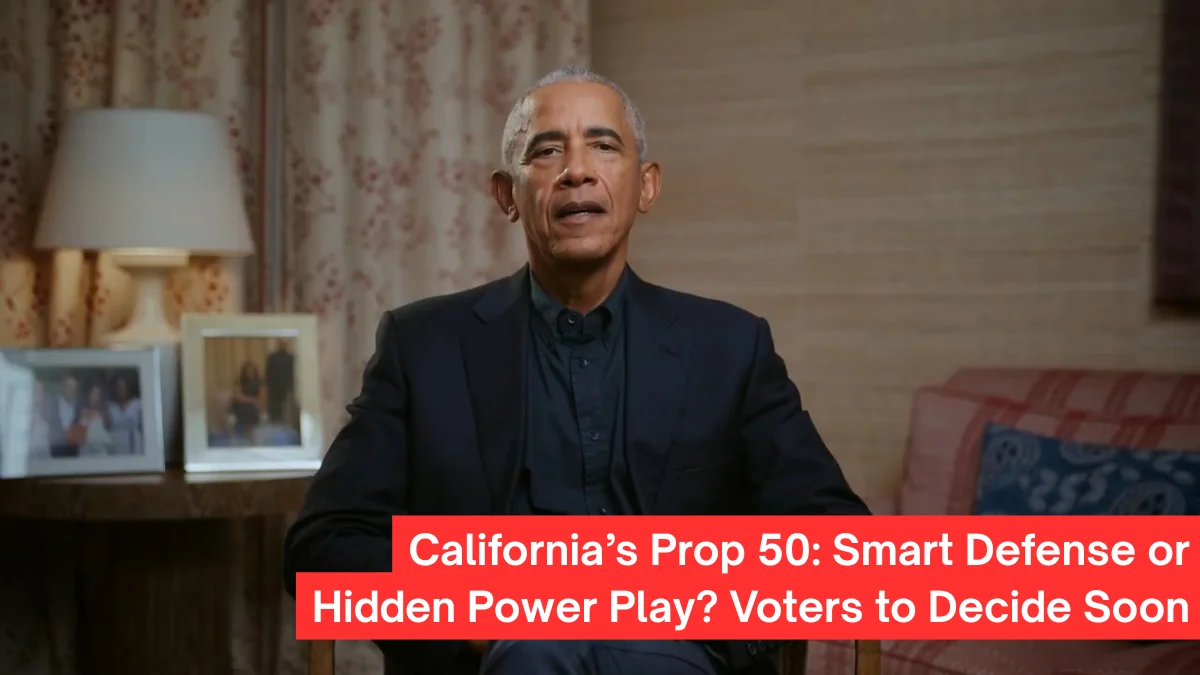California is once again at the center of a major political debate. Proposition 50 is heading to the ballot on November 4, and it could reshape how congressional districts are drawn for the next few elections.
Supporters say it’s a way to balance what Texas recently did; critics call it a direct challenge to voter-approved reforms. The outcome could influence who controls the U.S. House of Representatives for years.
Key Takeaways
- Proposition 50 allows lawmakers to redraw congressional maps for 2026, 2028, and 2030 elections.
- It’s designed to counter Texas’s recent Republican-led redistricting move.
- The plan would revert to the independent Citizens Redistricting Commission after the 2030 census.
- Critics say it undermines California’s voter-approved redistricting reforms.
- Polls show a tight race ahead of the vote.
What Proposition 50 Really Means
The core idea behind Prop 50 is simple. In June 2025, Texas lawmakers, with backing from Donald Trump, redrew maps that added five new Republican-leaning seats for 2026.
California Democrats responded with Prop 50, proposing their own redraw to possibly gain up to five Democratic seats.
If voters approve it, California’s legislature would temporarily take charge of district mapping for three election cycles 2026, 2028, and 2030 before authority returns to the independent commission.
Supporters call it a “necessary balance” to protect fair representation. Opponents say it breaks the state’s promise of keeping politics out of redistricting.
The proposal, known informally as the Election Rigging Response Act, is being sold as a short-term move to maintain political balance nationwide. But the controversy centers on whether this “temporary fix” could erode long-term public trust in California’s election process.
Polls Reveal a Close Contest
Recent polls highlight how divided voters are. A October Emerson College survey shows 51% in favor, 34% opposed, and 15% undecided. Another poll by Coefficient moved support slightly higher to 54%.
Urban areas such as Los Angeles and San Francisco show strong backing (around 65%), while regions like the Central Valley and Inland Empire lean against it (about 70%).
Early voting reports indicate more than 1.8 million ballots already submitted, suggesting high public interest.
A “yes” vote could help Democrats gain ground in Congress, potentially shaping national policies on healthcare, immigration, and clean energy. A “no” vote would maintain California’s independent system, seen by many as one of the fairest in the country.
Who’s for It and Who’s Against It
| Stakeholder | Stance | Key Quote/Reason | Buzz (Likes/Views) |
|---|---|---|---|
| Democrats (Newsom, Obama) | Yes | “Fight back against Trump’s scheme—temporary maps save democracy.” | 26K likes / 345K views |
| Republicans (CAGOP, Gallagher) | No | “Politicians picking voters—undoes citizen reforms for partisan gain.” | 1.3K likes / 17K views |
| Independents (Schwarzenegger) | No | “A big scam—fights ‘kings’ by empowering politicians, just like Texas.” | 28K likes / 897K views |
| Activists (SEIU, protesters) | Yes | “Holds politicians accountable to working people—counters GOP theft of seats.” | 125K likes / 2.9M views |
| Reform Experts (PPIC) | Mixed | “Restores 2026 fairness but erodes trust in California’s gold-standard system.” | 777 likes / 183K views |
Public Reactions and Protests
The debate intensified after “No Kings Day” on October 18, when millions joined nationwide protests against political overreach.
California saw a surge in activism, especially in cities like Los Angeles, San Diego, and San Francisco, where digital campaigns and memes supporting Prop 50 spread rapidly.
Social platforms recorded a 300% rise in discussions related to the proposition. Viral videos and protest visuals dominated timelines, with verified political figures and influencers driving much of the engagement.
Supporters see Prop 50 as a strong response to protect democratic balance. Opponents argue it’s a political maneuver disguised as reform, especially given the $282 million projected cost and potential legal battles that could follow.
Why It Matters for Californians
Prop 50 is more than a partisan issue it affects representation, spending, and national influence. A “yes” vote could strengthen the Democratic position in Congress and influence policies tied to jobs, climate, and healthcare.
A “no” vote maintains California’s reputation for transparent elections but could limit its influence in national power dynamics.
The decision now rests with voters. Whether it’s seen as a smart defense or a power grab, the outcome will set an important precedent for how far states can go in countering political moves across the country.







